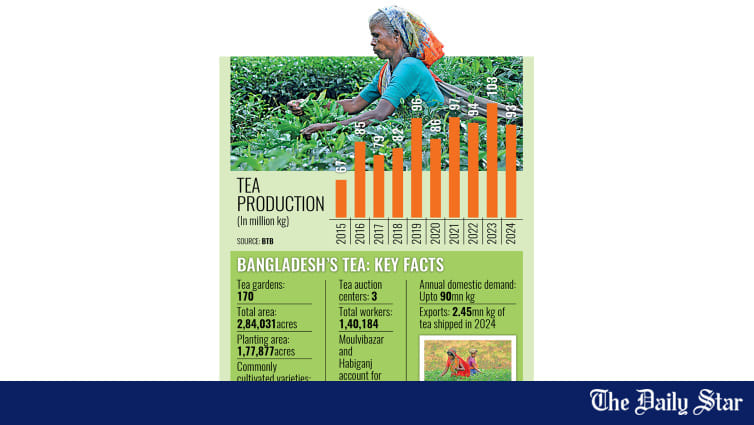Saif
Senior Member
- Messages
- 15,397
- Nation

- Axis Group


Tea industry needs deep reforms
The local tea industry that is deeply rooted in history and culture of Bangladesh is currently facing significant challenges. These challenges range from mismanagement and financial irregularities to poor working conditions and economic inefficiencies. If Bangladesh wishes to maintain its position
Tea industry needs deep reforms
Mir Mostafizur Rahaman
Published :
Feb 04, 2025 00:14
Updated :
Feb 04, 2025 00:14

The local tea industry that is deeply rooted in history and culture of Bangladesh is currently facing significant challenges. These challenges range from mismanagement and financial irregularities to poor working conditions and economic inefficiencies. If Bangladesh wishes to maintain its position as a major global tea producer (9th largest), the government must take urgent steps to reform and modernise the sector. It is to be in the best interest of not just the industry but also the 140,000 tea garden workers and half a million members of their community.
One of the primary issues in the tea industry is the lack of transparency in management. While some tea gardens are well-run, many suffer from poor administration, financial misappropriation, and corruption. To address this, the government must conduct a comprehensive mapping of all tea gardens, identifying well-managed ones and those that need urgent intervention. This process will help create a roadmap for necessary reforms and ensure that no tea garden is beyond scrutiny. Without such accountability, the sector will continue to struggle with inefficiencies that harm both workers and producers.
While social issues remain critical, economic factors are also putting immense pressure on the tea industry. Production costs have skyrocketed due to reliance on imported machinery, fertilisers, and pesticides. Recent hikes in diesel, electricity, and gas prices have further increased operational expenses by 15-20 per cent, making it harder for producers to stay competitive.
At the same time, productivity in Bangladesh is lagging behind the neighbouring countries. While India produces around 2,137 kg of tea per hectare, Bangladesh yields only 1,270 kg. Many tea plants are old and produce less, necessitating heavy investment in replanting and expanding cultivation. Since new plants take at least 10-12 years to generate profits, long-term financial planning is crucial. Without modernisation and better agricultural practices, the industry risks falling further behind.
Tea garden workers, most of whom belong to minority communities, remain among the most marginalised groups in Bangladesh. For generations, they have been deprived of education, economic opportunities, and social mobility. Simply, offering equal opportunities is not enough; these workers require preferential treatment to overcome the barriers imposed by historical injustices. Special educational programmes, skills training, and access to healthcare must be prioritised to uplift this community. The interim government carries a moral and social responsibility to address these inequalities and integrate tea workers more into the national economy.
Tea garden workers in Bangladesh have historically been subjected to extreme exploitation, dating back to British colonial rule. Even today, their daily wages remain shockingly low. The previous government set the minimum daily wage at Tk 170 bypassing the minimum wage.
The interim government now has an opportunity to correct this mistake by establishing a fair and respectable wage structure that truly reflects the workers contributions to the industry.
Beyond wages, labour laws governing tea plantations are rife with discriminatory practices. Employers routinely violate labour regulations, and state agencies under the Ministry of Labour often fail to enforce the rules. Fresh consultations with workers, trade unions, and stakeholders can help identify further gaps and ensure that tea garden workers receive the legal protection they deserve. This is a crucial test for the government's commitment to labour rights and social justice.
Another major concern is the stagnant price of tea at auctions. Despite rising production costs, auction prices have remained nearly unchanged for a decade. Tea estate owners argue that they bear the brunt of this disparity, as they are merely growers, not traders. Only a handful of growers are involved in packaging and direct sales, leaving most at the mercy of auction houses and intermediaries.
Studies show a significant gap between auction prices and retail prices, raising questions about whether the current auction system is the right mechanism for setting prices. The government should explore alternative pricing strategies, such as direct trade models, cooperative selling platforms, or government-backed pricing regulations, to ensure fairer compensation for producers.
A less-discussed but equally serious challenge is the brain drain in the tea industry. Due to poor financial incentives and out-dated facilities, fewer qualified professionals are joining the sector. During the Pakistan era, Bangladesh produced a variety of teas, including high-value orthodox black and green teas. Today, the industry primarily focuses on lower-quality CTC teas, limiting its market potential.
Additionally, the inclusion of lower-grade tea from North Bengal in the mainstream market has further diluted prices. Other tea-producing countries have embraced tea-centered tourism as a way to boost revenue, but restrictive lease agreements in Bangladesh prevent estate owners from diversifying into tourism. The government should consider revising these policies to encourage innovation and attract fresh talent into the industry.
The tea industry in Bangladesh is at a crossroads. Years of neglect, economic mismanagement, and social injustice have left it struggling to compete globally. However, with proper reforms, this vital sector can still be revitalised. The government must take decisive action by ensuring accountability in tea garden management, establishing fair wages, addressing social exclusion, modernising production, reforming auction pricing, and attracting skilled professionals.
If these reforms are not undertaken now, Bangladesh risks losing not just its global tea market share but also the well-being of thousands of tea workers who have toiled for generations. The interim government has a historic opportunity to change the course of the industry. Whether it rises to the challenge remains to be seen.
Mir Mostafizur Rahaman
Published :
Feb 04, 2025 00:14
Updated :
Feb 04, 2025 00:14
The local tea industry that is deeply rooted in history and culture of Bangladesh is currently facing significant challenges. These challenges range from mismanagement and financial irregularities to poor working conditions and economic inefficiencies. If Bangladesh wishes to maintain its position as a major global tea producer (9th largest), the government must take urgent steps to reform and modernise the sector. It is to be in the best interest of not just the industry but also the 140,000 tea garden workers and half a million members of their community.
One of the primary issues in the tea industry is the lack of transparency in management. While some tea gardens are well-run, many suffer from poor administration, financial misappropriation, and corruption. To address this, the government must conduct a comprehensive mapping of all tea gardens, identifying well-managed ones and those that need urgent intervention. This process will help create a roadmap for necessary reforms and ensure that no tea garden is beyond scrutiny. Without such accountability, the sector will continue to struggle with inefficiencies that harm both workers and producers.
While social issues remain critical, economic factors are also putting immense pressure on the tea industry. Production costs have skyrocketed due to reliance on imported machinery, fertilisers, and pesticides. Recent hikes in diesel, electricity, and gas prices have further increased operational expenses by 15-20 per cent, making it harder for producers to stay competitive.
At the same time, productivity in Bangladesh is lagging behind the neighbouring countries. While India produces around 2,137 kg of tea per hectare, Bangladesh yields only 1,270 kg. Many tea plants are old and produce less, necessitating heavy investment in replanting and expanding cultivation. Since new plants take at least 10-12 years to generate profits, long-term financial planning is crucial. Without modernisation and better agricultural practices, the industry risks falling further behind.
Tea garden workers, most of whom belong to minority communities, remain among the most marginalised groups in Bangladesh. For generations, they have been deprived of education, economic opportunities, and social mobility. Simply, offering equal opportunities is not enough; these workers require preferential treatment to overcome the barriers imposed by historical injustices. Special educational programmes, skills training, and access to healthcare must be prioritised to uplift this community. The interim government carries a moral and social responsibility to address these inequalities and integrate tea workers more into the national economy.
Tea garden workers in Bangladesh have historically been subjected to extreme exploitation, dating back to British colonial rule. Even today, their daily wages remain shockingly low. The previous government set the minimum daily wage at Tk 170 bypassing the minimum wage.
The interim government now has an opportunity to correct this mistake by establishing a fair and respectable wage structure that truly reflects the workers contributions to the industry.
Beyond wages, labour laws governing tea plantations are rife with discriminatory practices. Employers routinely violate labour regulations, and state agencies under the Ministry of Labour often fail to enforce the rules. Fresh consultations with workers, trade unions, and stakeholders can help identify further gaps and ensure that tea garden workers receive the legal protection they deserve. This is a crucial test for the government's commitment to labour rights and social justice.
Another major concern is the stagnant price of tea at auctions. Despite rising production costs, auction prices have remained nearly unchanged for a decade. Tea estate owners argue that they bear the brunt of this disparity, as they are merely growers, not traders. Only a handful of growers are involved in packaging and direct sales, leaving most at the mercy of auction houses and intermediaries.
Studies show a significant gap between auction prices and retail prices, raising questions about whether the current auction system is the right mechanism for setting prices. The government should explore alternative pricing strategies, such as direct trade models, cooperative selling platforms, or government-backed pricing regulations, to ensure fairer compensation for producers.
A less-discussed but equally serious challenge is the brain drain in the tea industry. Due to poor financial incentives and out-dated facilities, fewer qualified professionals are joining the sector. During the Pakistan era, Bangladesh produced a variety of teas, including high-value orthodox black and green teas. Today, the industry primarily focuses on lower-quality CTC teas, limiting its market potential.
Additionally, the inclusion of lower-grade tea from North Bengal in the mainstream market has further diluted prices. Other tea-producing countries have embraced tea-centered tourism as a way to boost revenue, but restrictive lease agreements in Bangladesh prevent estate owners from diversifying into tourism. The government should consider revising these policies to encourage innovation and attract fresh talent into the industry.
The tea industry in Bangladesh is at a crossroads. Years of neglect, economic mismanagement, and social injustice have left it struggling to compete globally. However, with proper reforms, this vital sector can still be revitalised. The government must take decisive action by ensuring accountability in tea garden management, establishing fair wages, addressing social exclusion, modernising production, reforming auction pricing, and attracting skilled professionals.
If these reforms are not undertaken now, Bangladesh risks losing not just its global tea market share but also the well-being of thousands of tea workers who have toiled for generations. The interim government has a historic opportunity to change the course of the industry. Whether it rises to the challenge remains to be seen.





